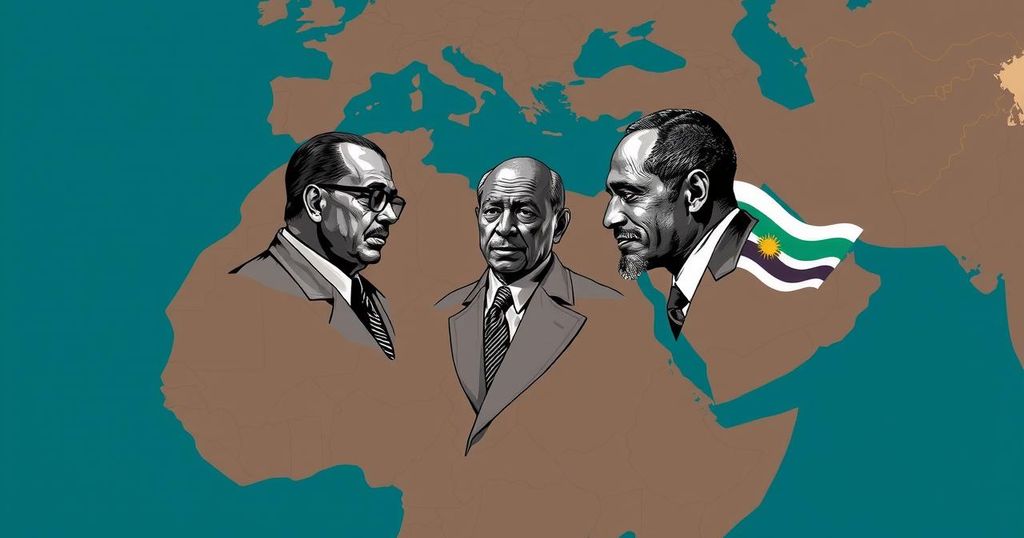Shifting Alliances in the Horn of Africa: The Egypt-Eritrea-Somalia Axis

The recent summit of Egypt, Eritrea, and Somalia suggests a significant geopolitical shift in the Horn of Africa, primarily aimed at countering Ethiopian influence amid ongoing regional tensions, particularly regarding the Grand Ethiopian Renaissance Dam. This emerging alliance signals a potential redirection of power dynamics, with Egypt strengthening ties with Somalia and Eritrea to address collective security concerns, all while navigating historical rivalries and territorial disputes that define the region’s complexity.
The recent trilateral summit among Egypt, Eritrea, and Somalia marks a significant shift in the geopolitical landscape of the Horn of Africa, a region historically marked by tension, conflict, and instability. Convened in Asmara, this gathering reflects an alignment among these nations in response to mounting security threats, particularly in relation to Ethiopia, Africa’s second most populous nation and a key player in regional dynamics. While the summit ostensibly aimed to promote cooperation and bolster regional autonomy, underlying motives suggest a desire to encircle Ethiopia amid ongoing tensions regarding its influence and actions in the region. The leaders—Isaias Afwerki of Eritrea, Abdel Fattah al-Sisi of Egypt, and Hassan Sheikh Mohamud of Somalia—underscored the importance of ensuring territorial integrity and resisting external interference in their joint statements. The Horn of Africa’s political fabric is complex, with Ethiopia often at its center, notably due to its contentious agreement with Somaliland and disputes with Egypt over the Grand Ethiopian Renaissance Dam (GERD). Ethiopia’s proposed acquisition of territory in Somaliland for naval use has fueled further tensions, particularly with Somalia, which has yet to recognize Somaliland’s independence following its 1991 separation. In August, Somalia formalized a military agreement with Egypt, amid ongoing security cooperation, with Egypt providing arms and equipment to assist Somalia against al-Shabaab insurgents. This development signals a thaw in Ethiopia’s relations with its neighbors while nurturing a strengthening Cairo-Mogadishu alliance. Discussions at the summit—the participants refraining from directly naming Ethiopia—suggested a collective response to unease surrounding Ethiopia’s regional undertakings. A principal factor fueling tensions is Egypt’s apprehension regarding the GERD, a massive project on the Blue Nile viewed by Cairo as an existential threat due to its implications for water supply. Ongoing negotiations have hit an impasse, exacerbated by Ethiopia’s actions, which have led to criticisms from Egypt that underscore fears regarding water politics—this situation precipitating Egyptian escalatory alliances in the Horn. Cairo’s military presence in Somalia serves as a strategic component to balance Ethiopia’s ascent in the region, as evidenced by arms transfers and involvement in UN-led security operations targeting al-Shabaab.
The geopolitical complexities of the Horn of Africa are underscored by its history of rivalries and conflicts that have shaped relationships among neighboring countries. Ethiopia’s centrality to regional dynamics stems from its various disputes, including its controversial dealings with Somaliland concerning access to the coastline, in addition to notable conflicts with Egypt over the vital waters of the Nile River. The GERD is significant for Ethiopia’s ambitions but poses serious challenges to Egypt’s longstanding water rights, leading to rising tensions between the two nations. The evolving alliances amidst the backdrop of these disputes highlight a tumultuous political landscape and provide insight into how regional actors are recalibrating their strategies in light of new threats and opportunities.
In summary, the summit involving Egypt, Eritrea, and Somalia indicates an important shift in alliances within the Horn of Africa, aiming to counterbalance Ethiopia’s growing influence in the region, particularly in the context of security and resource management. While this new partnership seeks to promote stability, it simultaneously risks escalating tensions, particularly over sensitive issues like the GERD and the status of Somaliland. Ethiopia’s response will be critical as it navigates these shifting alliances, necessitating adept diplomacy and collaborative frameworks to mitigate risks of conflict and ensure its strategic interests are safeguarded.
Original Source: thehill.com








